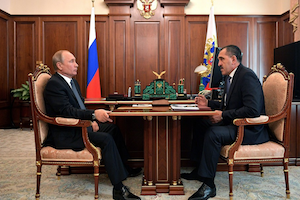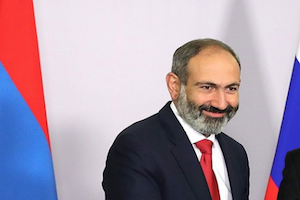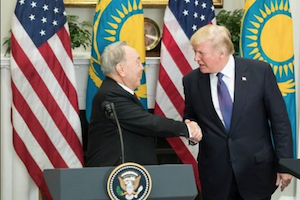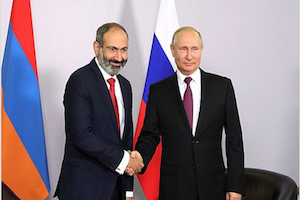Political Crisis is Looming in Ingushetia
By Huseyn Aliyev
October 2, 2018, the CACI Analyst
On May 27, Ingushetia’s Muftiate (The Muslim Spiritual Center of Ingushetia) excommunicated Yunus-bek Yevkurov, head of the autonomous republic in Russia’s North Caucasus. According to the head of the Muftiate, Isa Khamkhoev, the excommunication implies that Yevkurov is no longer a Muslim and is not allowed to participate in wedding and funeral ceremonies or other Muslim events in the republic. The Muftiate motivated its decision with Yevkurov’s persecution of the religious community, the illegal use of administrative resources to lobby against the Muftiate, and the use of security forces to seize land allocated for a mosque in the capital city Magas. Notwithstanding the excommunication, Yevkurov was reelected as the head of republic in the September 9 local elections.

Is Armenia's Foreign Policy Changing?
By Natalia Konarzewska
September 25, 2018, the CACI Analyst
August 17 marked the first hundred days in office for Nikol Pashinyan’s government in Armenia, which assumed office after the mass social protests erupting in April and May this year. The leaders of the protest movement underlined that they campaigned for domestic reform, yet the ensuing transition of power followed by a crackdown on corruption and a legal purge among the Armenian political elite has already reverberated in Armenia-Russia relations. Moreover, the new government’s stiff approach towards resolution of the Nagorno-Karabakh conflict has brought renewed tension in its relations with Azerbaijan.

U.S.-Kazakhstan Transit Agreement Faces Challenges From Russia
By Nurlan Aliyev
September 20, 2018, the CACI Analyst
During the Collective Security Treaty Organization (CSTO) foreign ministers’ meeting in Almaty on June 11, 2018, Russia’s Foreign Minister Sergey Lavrov informed his Kazakh counterpart of Moscow’s concerns over U.S. military logistics planning involving Kazakhstan, and biological laboratories in the country. The protest was prompted by President Nursultan Nazarbayev’s signature on May 5 of amendments to the 2010 U.S.-Kazakhstan agreement on commercial rail transit of special cargo to Afghanistan through Kazakhstan, which allow the U.S. to use Kazakhstan’s territory for supplying U.S. forces in Afghanistan. The exchange took place on the eve of the fifth Caspian summit, where the heads of the five littoral states signed a convention on the status of the Caspian Sea, according to which non-littoral states may not deploy armed forces to the Sea.

Georgia's Far Right and Mainstream Politics: Lessons from the EU
By Tomáš Baranec
August 28, 2018, the CACI Analyst
In mid-May, Tbilisi once again witnessed mass demonstrations led by various liberal groups. This time the unrest was fueled by a harsh police operation against alleged drug trafficking in two popular clubs in Tbilisi: Café Gallery and Bassiani. An otherwise quite common sight in the Georgian capital was dramatized by a massive opposing rally led by several Georgian far-right groups. Although not the first such demonstration, this rally seemingly initiated a process of consolidation and unification of Georgia’s political far-right. This process could lead to a rise of far-right, nativist and anti-EU narratives in Georgia’s political mainstream.

Moscow's Role in Armenia's Revolution
By Emil A. Souleimanov and Anton Barbashin
May 31, 2018, the CACI Analyst
The “Velvet revolution” in Armenia raised concerns about the possibility of a Russian intervention in this South Caucasian republic, for the sake of preventing Russia’s key ally in the region from slipping into “Maidanization” and Armenia escaping Moscow’s foreign political and security orbit. Yet events that unfolded illustrated Moscow’s rather ambiguous attitude toward the country’s bottom-up regime change, something that Russian elites, fearful as they are of Western-inspired “color revolutions”, have otherwise done their best to forestall. The explanation for Moscow’s reception of Armenia’s revolution lies in Russia’s clout in Armenia, the character of the popular demonstrations and the regime, and Nikol Pashinyan’s reassuring stance toward Moscow and its interests throughout his campaign.






 Book S. Frederick Starr and Svante E. Cornell,
Book S. Frederick Starr and Svante E. Cornell,